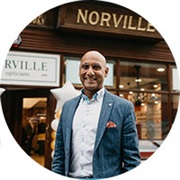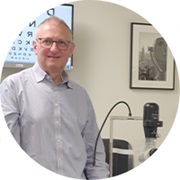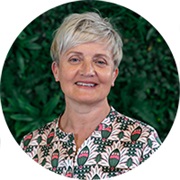- OT
- Life in practice
- Business management
- The economic outlook
The economic outlook
A webinar hosted by OT , in partnership with Hakim Group and the AOP, gained expert and on-the-ground perspectives of the business environment now, and in the year ahead

07 December 2023
Held in partnership with Hakim Group and the AOP, the webinar was moderated by Gavin Rebello, director of eight Hakim Group independent practices in the Midlands.
Rebello is also a member of SharkLink, the group of Hakim Group practice owners that provide a link between practices and head office.
The webinar featured a presentation by Martin-Fagg, shedding light on the headlines around the economy by a panel of independent practice owners discussing their perspectives.
Looking at data tracking money growth in the UK, the economist suggested that figures indicate low or no growth in 2024, and that money supply is contracting in the UK, Republic of Ireland, the European Union and the US.
“The first most important point is that there is no case for further increase in interest rates, and I don’t think we will see any more now,” he said.
Data suggests some prices are returning to normal. The cost of shipping, seen through the Baltic Index, has returned to pre-pandemic levels.
Gas prices, however, will not return to levels experienced before the war in Ukraine, because Europe is now importing liquefied petroleum gas, which is transported in large vessels, rather than gas from Russia that came via pipeline.
Five factors in the UK
Martin-Fagg explained that the UK as a whole is experiencing five unique circumstances, the first being the continuing effects of Brexit – “an expensive problem” – and the second being that the country has had five different prime ministers in seven years.“Imagine that the person running your business changes every 18 months and they have all got a different approach. The result is basically chaos,” he said.
Thirdly, the country is experiencing a permanent shortage of labour as a result of demographics – something that does not apply in the Republic of Ireland.
Chronic underinvestment – the fourth factor – has been the result of political uncertainty, he said, while finally, and “most importantly, our global reputation is pretty lousy right now.”
Martin-Fagg then shared data detailing the UK’s investment share in GDP, which notes the effects of political instability on investment.
“Our growth rate over the next few years is going to be low and we’re going to have to spend a lot of time and effort building investment to get growth up,” he said.
Looking at growth performance, Martin-Fagg shared that between 1950–2008, the UK averaged 2.3% per annum (pa), dropping to 1.3% pa following the financial crash in 2008–2016.
With COVID-19 and Brexit, the period of 2016–2023 has seen an average of 1.1% pa, while the year 2022-2023 specifically saw approximately 0.3%.
Imagine that the person running your business changes every 18 months and they have all got a different approach. The result is basically chaos
Household net balance rose during lockdowns and furlough, Martin-Fagg said, and since March households have spent everything that they earned each month.
He said: “This means they are not drawing on the accumulated funds they had during the lockdown period. That is why, even though money supply is shrinking – what is going into the pipe – there is still money within the pipe that people can draw on to maintain their consumption spending.”
This is why there is no recession, he added.
Shrinkflation
This is ‘shrinkflation’ – spending more money but receiving less for it.
Providing an example, he shared that when he travels long distances and requires a “sugar rush” he opts to purchase a Snickers bar.
“Today, a bar is about two bites, so you have to buy two. That is shrinkflation,” he said.
The public view
Martin-Fagg addressed some of the common views of the public in terms of the economy, such as the view that the UK is in a recession.“We are not in a recession according to the official definition, which is two successive quarters of negative growth. We haven’t experienced that, and I don’t think we will,” he said.
Instead, the UK is experiencing ‘stagflation’ – where prices are running at a 5–6% increase but output is at 0.2–0.3%.
The public also believes that their real income is falling. Martin-Fagg pointed out: “It has been, but it hasn’t fallen in the last three months, it has actually risen.”
In the last three months, real incomes have risen in line with the long-run average, and the figure is 1.3% before tax.
The public believes they are paying more tax, and Martin-Fagg suggested this is the case, particularly in the form of fiscal drag – where allowances are fixed but due to salary increases, tax-take increases.
Around 23% of the workforce now pays tax at 40%, up from 16% pre-COVID-19.
Looking at the effect of higher interest rates, Martin-Fagg shared that currently, 1.2 million out of 28 million households have had to renew their mortgages at higher rates, but over the next three years, a total of four million households will have to renew at a rate of around 5-6%.
However, “some people are in the money,” he suggested: “The 12 million pensioners, most of whom own their house with no mortgage. Their average savings are 113K and the interest they are getting on that varies from 1.5–5%.’
The state pension saw an increase of 10% in 2023, and will see an 8% boost in April 2024.
“It is the over 60s that have spending power, and it is families in their mid-30s with a mortgage that is just being renewed that are being squeezed,” he said.
The workforce
Unemployment is rising by 0.2% and vacancies have dropped from 1.1 million to 988,000.Describing the labour market as “still tight,” Martin-Fagg said this challenge will remain for at least 10 years as a result of demographics.
Looking at the labour force for 2023, he shared that there has been a net increase in the workforce of 330,680, plus 195,000 work visas have been issued.
“The problem is that 500,000 55-65-year-olds retired early, so the net increase is zero,” he said. “If you recruit someone, you are taking them from another employer. You have a zero-sum game as employers are recruiting for the fixed pool of available labour.”
The economic outlook at the end of the year
Looking at the end of 2023, Martin-Fagg shared that the UK will have grown somewhere between 0.2–1% and Ireland will have grown by 4%. The inflation rate in both countries will be the same at 5%.Earnings growth in the UK will be faster than Ireland at 6% versus 4.3%, and house prices will be flat in the UK but grow by 1.5% in Ireland.
“You will have heard of record insolvencies,” Martin-Fagg noted. While these are terrible for the individual who loses their business, it is beneficial for the system as a whole, he suggested, as this releases resources.
Mergers and acquisitions will increase, he said, adding: “Some of you might be increasing your market share by buying weaker competitors.”
“Given our underinvestment and demographic, our real growth rate will not be better than 1% per year over the next two to four years until we get productivity up, or we import people from the rest of the world.”
What could be ahead
Providing some guesses for what the end of 2024 might reveal, Martin-Fagg predicted: “I think the UK will do pretty much what it has done this year, and Ireland will do a bit better.”Inflation in Ireland (3%) will be lower than in the UK (4%), because of higher levels of productivity.
Interest rates will reach 5% in the UK and 4% in Ireland, house prices will grow by 1% in the UK while there will be an oversupply in Ireland, and insolvencies will still be at a record high.
“I’m sure there will be a Labour, or a Labour/Liberal Democrat coalition government,” Martin-Fagg said.
Roger Martin-Fagg: one key message the incoming Government will need to bring to the public
A positive outlook
Providing advice for practice owners, the economist said: “You are not going to grow your business by employing more people. That will be very expensive.”
Instead, he recommended investing in and utilising technology, such as instruments that would help to reduce chair time.
The customer always comes first, he added, and businesses have to present a very good value proposition in order for them to spend.
“Because the economy is essentially growing by 1% or less, your growth will be at the expense of someone else,” he noted.
Martin-Fagg emphasised the demographic of over 60s who tend to have more spending power than younger groups.
“For your businesses I would suggest things are looking bright. People might say that they are losing confidence and will save more money – maybe they will – but I don’t think so. My view is that the next 18 months are not going to see a recession,” he said.
Gavin Rebello: We’ve heard that inflation is high so practices have increased their prices more than they might usually just to stay ahead of inflation. How are patients feeling about price increases?

Gavin Rebello
Occupation:Director at eight Hakim Group independent practices and a member of SharkLink
Location:England

Paul Adler
Occupation:Optometrist and director at Paul Adler Optometrist
Location:England

Dr Scott Mackie
Occupation:Optometrist and director at Mackie Opticians
Location:Scotland

Chris Tannorella
Occupation:Optometrist and director at Julian Davies Opticians and Bateman Opticians
Location:Wales

Mairead Colleran
Occupation:Optometrist and director at Maloney Keady Opticians
Location:Ireland

Margaret Mckergan
Occupation:Practice buddy at Hakim Group
Location:Northern Ireland.
Margaret Mckergan: “I think it is not necessarily about the cost, sometimes, but about your perception of what value is: getting a good clinical service and good quality products. The perception of that is all about the customer journey and the expectation of what value is to them.”
Rebello: One thing that came from Roger is the advantage that our patient base is skewed towards an older demographic. Pensioners are better off, and the Mintel report suggest older demographics are less likely to put off having an eye examination. Are you finding that patients are making healthcare a priority?
Paul Adler: “We’ve always done very well with extended eye examinations, but we’ve noticed two ends of the market that seem to be changing. I’m seeing a lot of children coming, including infants. Where previously they were seen under the hospital eye service, they have been lost to follow-up or haven’t been able to get appointments and the parents are very worried. This is often funded by grandparents, not just parents.“Then in older patients we see a huge number coming in where we’re being asked to provide a second opinion on medical opinions and give reassurance. They are having lots of additional tests – whatever is required. We’re seeing a lot of patients coming to us for urgent eye care where they are not necessarily entitled or can’t easily get it. Patients are caring much more about their eye care and their families’ eye care and are grouping together to fund it very often.”
Rebello: There have been big changes recently in Wales. What is happening there?
Tannorella: “The beginning of our new Welsh General Ophthalmic Services contract was 20 October. These conversations have been happening for a long time in Wales informally, about how we expand on the Eye Health Examination Wales service and the Welsh low vision service. The pandemic kicked off the formal negotiations, when practitioners in Wales with higher skillsets showed what they could really do and helped when secondary care ground to a halt. I think the impact is going to be really positive. What it means is that we are getting paid much more fairly for our clinical time. There are higher levels of clinical care which we can opt into if we want to. As a business, we are forecasting a 15–20% increase in our NHS income next year, which can only be a positive thing.”Rebello: With an upskilling across the country in Scotland, have you found it harder to differentiate?
Dr Scott Mackie: “The upskilling is massive. With the education strategic review in Scotland, we are looking at having independent prescribing (IP) as a mandatory part of the undergraduate course. There are more IP optometrists per capita than anywhere else in the UK, so upskilling all staff is important. Getting paid appropriately, as in Wales, too. We’ve got a 6% increase in fees, a minimum 3% per year, and getting paid much more for what we do. People appreciate it when they come in and see how skilled you are. That resonates into retaining patients and sales leading on from that. Although the new courses will allow for people not to pursue IP qualification if they do not wish, I think that will be the minority.
“We’ve just introduced a new glaucoma contract. This is not shared care, they are our patients and we make all the decisions. I think this is the way forward.”
Rebello: Roger said that in the UK we’ve had five prime ministers in a short space of time. In Northern Ireland, though, what is the impact of a lack of a functioning government on consumer confidence?
Mckergan: “We’ve been here before. This is our second time with no government. It is a double-edged sword and has impacted confidence slightly. It has driven the consumer to purchase locally, and with recognition of the optometrist on the High Street, they are staying more local. But they are unconfident in having no parliament and government, and also, we are not very confident in the UK taking our best interests regarding the protocol.”
Rebello: A major advantage a lot of independents had as we came out of COVID-19 and people were working from home, was that a lot of people didn’t want to return to the big cities and would rather shop locally. Have people stayed local?
Colleran: “That had been one of the positive fallouts from COVID-19 because everybody was staying local. They had no choice and previously might have gone into the bigger cities or towns. Now what we’ve found I that with hybrid working or working from home, even now we have people coming for the first time. I think they enjoy the experience in an independent and they have more time to experience it. We have reaped the benefits and hopefully we continue to.”
People appreciate it when they come in and see how skilled you are
Rebello: How are you feeling about 2024?
Mackie: “It’s a sunny outlook in patient outcomes and our own outcomes. One thing about people being more local is that it is all about holistic care. When people come in, we might be discussing low vision, anti-smoking, working with pharmacy and GPs, all working together, and patients appreciate that. It makes the whole pathway much more interesting, not just for the patient but the practitioner. It is a great time to be in practice and I am loving it.”
Mckergan: “It’s a bit of a mix. The last quarters indicated that it’s looking quite bright, however the biggest thing for us is whenever our government gets in, so we get a bit more certainty. I think once we get a bit more clarity in the government, we’ll definitely have a bit more sustainability. It’s definitely not doom and gloom; we’re looking forward to good growth in 2024.”
Tannorella: “Really positive. We’ve got a new contract which is paying us more fairly. We’ve got additional schemes which we can opt into, should we choose to, if we have the skillset. For us as a business we’ve invested more than ever this year in our team and infrastructure against the gloomy headlines in the news and I think that’s going to be really important, we’re going to continue to do that.”
Colleran: “In Ireland, optometry is definitely on the up. For the first time we have a hospital optometry grade. We’re being viewed as we should be in the healthcare system, more than we have. There is a long way to go, but since COVID-19, I have much more liaison with the GP, whereas before it would have been more separate. Since we were deemed an essential service in COVID-19, I think it increased our level in the healthcare industry.”
Advertisement


Comments (0)
You must be logged in to join the discussion. Log in